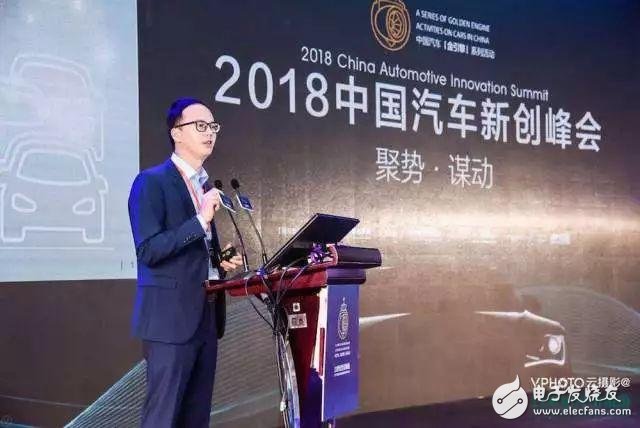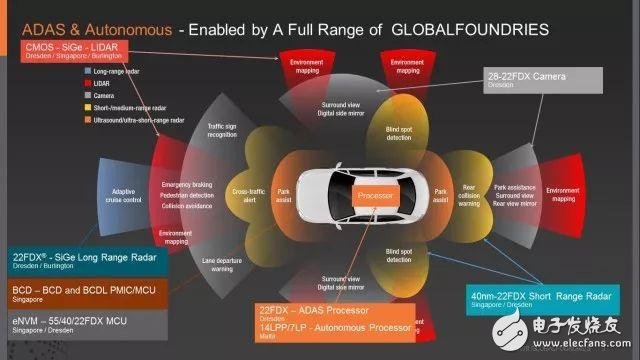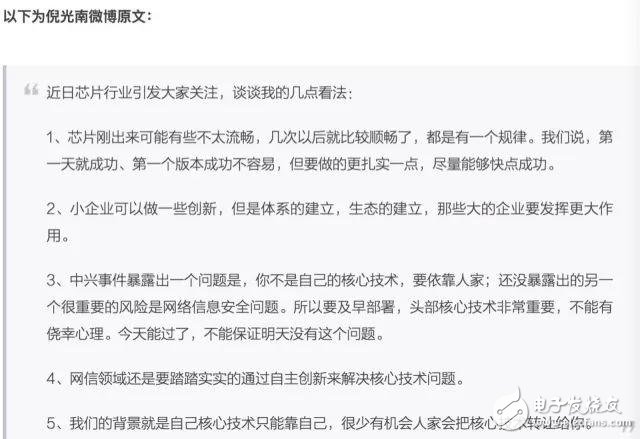Some time ago, the Sino-US trade war, Trump made a little on the chip, ZTE - the world's top four communications companies almost stopped. "The US ban may cause ZTE to enter a state of shock." The words of Yin Yimin, chairman of ZTE, are awkward. At that time, senior people in the automobile circle discussed with the elder brother that although China has grown stronger in the past years, it is all puffy, and the United States is a scorpion. A contest, it will not work. It’s too much image. In this contest, the chip became the death of ZTE, and Trump was done with a single click. This not only exposes the fact that some industries in China are large but not strong, but also exposes the weakness in the development of core components such as chips. As everyone knows, there are many dead spots like the chip in the Chinese auto industry. In recent years, China's auto production and sales have exceeded 28 million, and some of its own brands have sold more than a million vehicles, which is very eye-catching. However, as the above veterans say, this is also puffiness. Take the chip, it is not only a dead hole in the Chinese automobile industry in the past few decades, but in the era of intelligence and networking, it is still the dead hole of Chinese cars, and even a bigger and more vulnerable attack. Regardless of the new forces of the car or the old forces, there is no way to go outside. The ZTE chip crisis is just a preview of the car chip crisis. This is not an alarmist: On May 31, at the China Automotive Innovation Summit, the 21st Century Business Herald and Roland Berger jointly launched the "New Trends of Vehicle Companies' Future Competitiveness Report". According to the report, in the automotive industry's trend towards intelligent, autonomous driving, digitization and electrification, with the introduction of deep learning algorithms, the amount of data processing continues to increase, and the outside world has proposed a higher level for the automotive computing architecture and the chip itself. It is required that the supercomputer will become the core component at that time. A serious fact put forward by the "Report" is that foreign countries are in an absolute leading position in the automatic driving super-calculation chip, and form a giant-led situation. Based on its powerful GPU platform, Nvidia has developed its own autonomous driving platform; Intel and Qualcomm have acquired the layout of autopilot supercomputers through acquisitions and leveraging their own advantages. On the contrary, the domestic autopilot supercomputer is still in its infancy and its market share is low. The development of the domestic chip industry is mainly subject to the two ends of the industrial chain. The main bottlenecks in the two major aspects of design and manufacturing are talents and technology, while the sales side encounters market blockade by industry giants. It can be imagined that if two years of automatic driving and intelligent popularization, Chinese brand cars will also achieve automatic driving. In case one day Trump provokes a trade war, and then do some tricks on the chip, it is expected that China’s automatic Driving a car must be on the road or crash. Or it is to surrender to Trump. In short, the situation is definitely as passive as ZTE. This is the serious fact that Chinese cars face in the field of chips. It is no wonder that the chairman of the China Automotive Engineering Society paid for Wu’s chip crisis in China’s car. The former chairman of Jianghuai Automobile, Zuo Yanan, also expressed the feeling that the Chinese car has been greatly upgraded in recent years, but the progress of core components is not satisfactory. The funny thing is that the domestic auto industry has been playing a water shelf recently, arguing about the new forces and traditional forces who can survive, but rarely calm down and think about how to jointly face the international monopoly of key chip technologies. To understand the importance of the chip for the new car, let's first understand the role of the car chip. The chip is hailed as the "industrial grain" of the country, and is the "heart" of all the whole equipment. It is widely used in computers, consumer electronics, network communication, automotive electronics and other fields, and it plays a role of "life and death." The chip is very versatile in the automotive field, and it can be said that it can't run without a chip car. In addition to common multimedia entertainment systems, smart keys and automatic parking systems, the chip is also widely used in automotive engine and transmission control systems, airbags, driver assistance systems, electric power steering, ABS, electronic stability systems (ESP), Pedestrian protection, tire pressure control, electric windows, lighting control, air conditioning system, seat adjustment system, can be called the nerve of the car. According to statistics, in 2011, approximately 75 million vehicles were produced worldwide, with an average of approximately $300 worth of chips per vehicle. According to data released by Bloomberg Industries on June 23, 2013, the average semiconductor cost per new car reached $329. With the advent of automotive intelligence, car networking, autonomous driving, safe cars and new energy vehicles, the use of automotive chips will be more widespread. According to a report, in 2013, the market value of domestic automotive chips reached US$4.1 billion. As mentioned in the "Report" above, in the new era of automobile, due to the rise of autonomous driving and car networking, supercomputer chips will become the core components of automobiles, and they are as important as engine gearboxes and batteries. It can be said that there is no car without a chip. Chips are so important to cars, but domestic car chip technology is still very weak. In the past few years, the automotive industry has focused on the upgrading of powertrains, design and other fields, and has not taken into account the subtle core components of such chips. The chip crisis in China's auto industry has been going on for many years, accompanied by the growth of Chinese cars. In 2013, when eDonkey brother worked in China Youth Daily, he wrote a report on “The Chip Becomes the Soft Bottom of China's Automobile Industryâ€, which caused concern in the industry. At that time, Fu Yuwu, chairman of the China Automotive Engineering Society, pointed out the chip crisis. Automotive chips are 100% totally dependent on imports, with annual imports reaching $231.3 billion. "China's automotive electronics IC market, automotive electronics IC market is basically dominated by foreign manufacturers, Freescale, Infineon, NXP, STMicroelectronics, Ruisa, Bosch, Texas Instruments, etc. occupy the majority of the market share, There are very few domestic suppliers. Over the years, we have often heard that electric vehicles have been developed to avoid the oil crisis. In fact, the chip crisis is more serious than the oil crisis. The data show that China's chip industry has long been controlled by foreign manufacturers. Imports consume more than 200 billion US dollars of foreign exchange each year, surpassing oil to become the largest import commodity. Moreover, the technical equipment subject to people directly restricts the development of China's information industry. Domestic companies lack core competitiveness in the development of automotive chips. "Most of the domestic chips are imported, especially the core automotive electronic control chips are basically in the hands of foreigners. The domestic automotive electronic chip technology is very far away." Chen Changnian, the equipment minister of the China Automotive Engineering Society, once felt so. The reliability of the car on the chip is very high. Generally, the operating temperature of the consumer electronic chip is between -20 degrees and 70 degrees. The operating temperature of the car chip must meet the temperature range of -40 to 85 degrees, and it must withstand the thermal shock. Electromagnetic compatibility, anti-interference and other pressures. This has created a certain technical threshold for automotive chip suppliers. At present, although China has accumulated certain technologies in this field, it is still quite large compared with the international advanced level. There are few companies engaged in the research and development of automotive electronic chips, with weak technical strength and lack of design capabilities. It is conceivable that after the automatic driving in the future, the requirements for super-calculated chips will be higher. At that time, if all Chinese cars use foreign chips, what if they run into the ZTE crisis? Looking at the domestic new car power and traditional car companies, which one can be untouched on the chip? The eDonkey brother randomly consulted several new automakers with auto-driving as their core competitiveness, and they are both happy and worried. It is worthy of praise that some car companies have already developed their own chips. For example, the zero-running car is very powerful in the security field. It currently purchases TI and INTEL chips, but also cooperates with Dahua to develop self-driving chips. There are hundreds of chip development teams. In addition, BYD also has certain technical accumulation in chip research. BYD established Microelectronics in 2004, specializing in chip R&D and manufacturing. It currently has a complete industrial chain from IC design to power chip design, wafer fabrication, IC package testing, module packaging and testing, and has more than 2,000 engineers. IGBT chips and modules independently designed and manufactured by BYD are the core components of new energy vehicles and have been applied to BYD electric vehicles in batches. But overall, there is still a big gap between domestically produced car chips and the international market. Seeing the above facts, perhaps we can all come to a conclusion: If we want to change lanes and overtake in the new era of automobile, we will first develop supercomputer chips. Otherwise, regardless of information security or industrial security, it will be greatly challenge. When talking about the ZTE chip crisis, Ni Guangnan, an academician of the Chinese Academy of Engineering, said: The ZTE incident revealed that you are not your own core technology and rely on others; another important risk that has not been exposed is the issue of network information security. Therefore, to deploy early, the core technology of the head is very important and cannot be lucky. I can pass today, there is no guarantee that there will be no such problem tomorrow. He also said, "We have always said that we have to make our own chips. If you don't do it, you will encounter many problems. The core technology is subject to people is our biggest hidden danger. The ZTE incident also verified this. If you don't master the core technology, people Sooner or later, we will use various methods to set obstacles for you. We must invest early and solve problems through independent innovation, and we must not be lucky." It’s really awesome. Ni Guangnan’s words are very applicable to the new car of Chinese cars. Otherwise, the fierce new car will be played in the palm of the game by Trump. Why is China's automotive chip technology so weak? Why are all independent brands not emphasizing independent research and development in the chip field? Why are so many investments pouring into bicycles and carpooling to burn money instead of investing in R&D chips? This is a problem that often plagues elder brothers. Ni Guangnan's words give some answers. He said that in the manufacture of chips, investing hundreds of billions is at least, and it needs to be continuously invested. Only in this way can China's chip manufacturing catch up with the world's advanced level. Ni Guangnan believes that in the R&D and manufacturing of chips, it is necessary to rely on more support from the state. If enterprises rely on this, it may take more than ten years to make profits, and the investment risk is too great. In addition, the break-up of the independent chip industry is not something that a company can afford. It requires strong support from the state, cooperation between upstream and downstream industries, and division of labor among multiple companies. It seems that the development of the chip industry does require the systematic guidance and support of the state. But from a global perspective, chip technology is not an impossible breakthrough, and there are several examples of it. For example, more than 20 years ago, when Ni Guangnan tried to develop Normal Electric Test Pen,Screw-Driver With Voltage Tester,Combination Screw Driver Set With Tester,Voltage Detector Tester YINTE TOOLS (NINGBO) CO., LTD , https://www.yinte-tools.com




